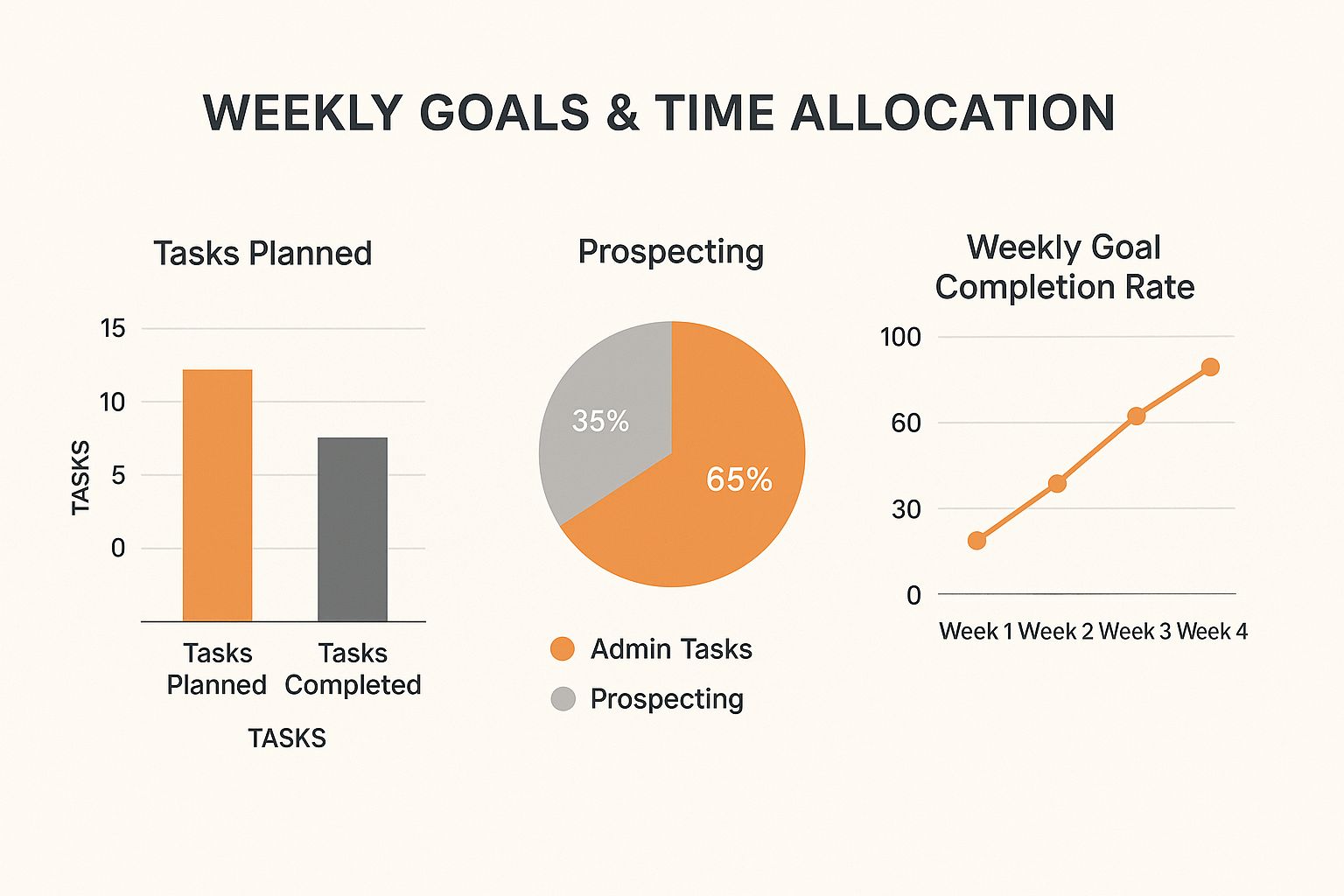Time Management For Realtors: Proven Systems To Close More
Master time management for realtors with proven strategies that actually work. Learn how top agents protect revenue hours and streamline daily workflows.
Understanding The Real Time Challenge Every Realtor Faces
The real estate industry is fast-paced and demanding. Realtors juggle client communication, property showings, market analysis, and mountains of paperwork. Many realtors feel overwhelmed, constantly busy, but not seeing the results they want. Why doesn’t traditional time management advice work for real estate professionals? It’s because of the unpredictable nature of the business.
One of the biggest challenges is the constant need to switch gears. Unlike a typical 9-to-5 job, a realtor’s schedule is rarely set in stone. Last-minute showings, urgent client calls, and sudden market changes can disrupt even the most carefully planned day. This makes it hard to use rigid time management systems designed for more structured careers. Imagine: you’ve blocked two hours for administrative work, but a client suddenly needs to see a property right now. This constant reactivity can leave realtors feeling busy but not productive.
Many realtors also prioritize urgent tasks that don’t actually generate income. Effective time management means knowing the difference between being busy and being productive. This requires a shift in focus toward activities that directly affect your bottom line. Are you spending more time on administrative tasks than with clients? Are you prioritizing busy work over lead generation? Honestly answering these questions is the first step to taking back control of your schedule. This means analyzing your current workflow and finding areas where your time isn’t being used well. Real estate agents often spend about 60% of their time on administrative tasks, including paperwork, marketing, and other non-client-facing activities. For more detailed statistics, check out this helpful resource: Learn more about time management for realtors.
Identifying Your Biggest Time Drains
Knowing where your time goes is crucial for effective time management. It’s like managing your finances – you need to understand your spending habits before creating a budget. Tracking your daily activities for a week can reveal surprising insights into how you manage your time.
- Track Everything: Log every activity, from phone calls and emails to showings and paperwork. Be completely honest with yourself.
- Analyze the Data: Look for patterns and identify tasks that consistently take longer than expected. Are there regular meetings that could be shorter or unnecessary?
- Categorize Activities: Group similar tasks together, such as lead generation, client communication, and administrative work. This helps you visualize where most of your time is spent. This is the foundation for optimizing your workflow and prioritizing activities that generate revenue.
Protecting Your Prime Revenue Hours From Daily Distractions

Protecting Your Prime Revenue Hours
In real estate, your prime revenue hours are the most important time of your day. These are the hours you spend face-to-face with clients. Maximizing this time is what separates successful realtors from the rest. Top-performing agents understand this and plan their days accordingly. They focus on high-value activities and make sure administrative work doesn’t eat into their selling time.
Mastering the Art of Saying “No”
Learning to say no to time-wasters is essential. However, it’s important to do so politely. This doesn’t mean ignoring your clients’ needs. It means strategically choosing which activities truly make a difference.
For example, going to every open house might seem productive. But focusing on pre-qualified leads often offers a better return. This means setting clear boundaries and expectations. It ensures your energy is focused on income-generating tasks. You might be interested in: How to master your real estate business with a mentor.
Blocking Your Most Productive Hours
Time blocking is a powerful strategy. It involves scheduling specific blocks of time for essential tasks. These might include lead generation, client meetings, and property showings. These blocked-off times should be treated like important appointments. Protect them from interruptions so you can concentrate on revenue-generating activities.
It’s also important to set clear communication protocols. This will help manage client expectations regarding your availability.
Handling Interruptions Diplomatically
Interruptions are unavoidable. Learning to manage them diplomatically is key to maintaining strong client relationships. This might involve setting specific times for returning calls and emails. You could also have an assistant screen calls and prioritize urgent matters.
This makes sure you’re accessible while minimizing disruptions. By establishing clear boundaries and communication channels, you can provide great client service while protecting your prime revenue hours. This approach allows for flexibility and a structured approach to time management.
Streamlining Administrative Work Without Losing Quality
Administrative tasks are essential for realtors, but they shouldn’t monopolize your entire workday. Successful realtors have optimized their paperwork, marketing, and other back-office operations. They leverage systems and workflows to prioritize client relationships and closing deals.
Batching Similar Activities for Maximum Efficiency
Batching similar activities is a highly effective technique. Instead of spreading administrative tasks throughout the day, schedule dedicated blocks of time. For example, allocate Monday mornings to paperwork and Tuesday afternoons to marketing. This focused approach minimizes distractions and boosts efficiency. Just like prepping all your ingredients before cooking, it streamlines the entire process.
The Power of Templates in Real Estate
Creating templates for common documents, emails, and social media posts saves valuable time. Templates maintain consistent branding and messaging, reducing time spent on repetitive tasks. This frees up more time for client interaction. You can also personalize templates for individual client needs, maintaining a personal touch while boosting efficiency.
Identifying Tasks for Systematization or Personal Touch
Not all administrative tasks require your personal attention. Discerning which tasks can be systematized or delegated, and which require your expertise, is crucial. Scheduling showings or managing social media could be automated or delegated. However, tasks like contract negotiation or personalized client advice demand your direct involvement. Understanding this distinction is key for effective time management. The following table illustrates the impact of optimization on common realtor tasks:
To demonstrate the time savings realized through implementing these strategies, let’s take a look at a typical week for a realtor.
Administrative Task Time Audit: Before vs After Optimization
| Task Type | Time Before (Hours/Week) | Time After (Hours/Week) | Time Saved | Optimization Method |
|---|---|---|---|---|
| Email Management | 10 | 2 | 8 hours | Email Templates, Automated Responses |
| Document Preparation | 8 | 1.5 | 6.5 hours | Document Templates, E-signature Software |
| Social Media Management | 5 | 1 | 4 hours | Social Media Scheduling Tools |
| Scheduling & Appointments | 6 | 2 | 4 hours | Online Scheduling Software |
| Client Follow-up | 4 | 1.5 | 2.5 hours | CRM System, Automated Follow-up Emails |
| Data Entry & Reporting | 3 | 0.5 | 2.5 hours | Database Integration, Reporting Software |
As the table illustrates, implementing these strategies significantly reduces time spent on administrative tasks, resulting in substantial time savings that can be reallocated to client interaction and revenue-generating activities.

Infographic about time management for realtors
This infographic further emphasizes this point, visually demonstrating how prioritizing client-facing tasks and streamlining administrative work contributes to increased productivity and business growth. See our guide on How to master real estate marketing for more efficient marketing strategies. Focusing on productive activities is crucial for business growth. By implementing these strategies, realtors can significantly reduce administrative time without compromising service quality. Many agents report cutting their administrative time by 50%, leading to higher client satisfaction and business growth. This underscores the value of working smarter, not harder, in real estate.
Choosing Technology That Actually Helps Instead Of Hurts

Choosing The Right Technology
Technology promises to make our lives easier. However, for real estate agents, it can feel like the opposite. Choosing the right tools is key to effective time management. The wrong technology can create more work than it solves, leaving you feeling overwhelmed. This is especially true in the demanding real estate industry. This section will help you select the tools that empower you, not slow you down. It’s also important to understand how digital tools are changing the real estate market. Agents are increasingly relying on technology to improve productivity and automate routine tasks. Want to learn more? Find more detailed statistics here.
Strategic Approaches to CRM, Marketing Automation, and Communication
A Customer Relationship Management (CRM) system should be the center of your business. It should streamline client communication, track leads, and manage transactions. But a complex CRM can become a major time waster if not used correctly. Choose a system that works with your existing processes and offers the features you actually need.
Similarly, marketing automation can be a huge help, but only if it aligns with your overall marketing strategy. Automating the wrong messages or targeting the wrong people wastes time and resources. Focus on tools that automate key marketing tasks, like email campaigns and social media posts, while still allowing for a personal touch. Interested in other helpful resources? Check out this article: How to master real estate photo editing.
Avoiding Technology Pitfalls and Evaluating New Tools
Many realtors make the mistake of adopting every new technology available. This can lead to technology overload and a disorganized workflow. Before investing in a new tool, ask yourself some important questions:
- Does it solve a specific problem I’m experiencing?
- Will it work with my current tools?
- Is it easy to use and understand?
- Is the cost worth the potential time saved?
To lessen administrative burdens, realtors can explore solutions like document automation software. Taking the time to evaluate new tools will ensure they help your business succeed.
Implementation Strategies to Prevent Overwhelm
Implementing new technology takes time and effort. Don’t try to adopt everything at once. Start with one or two essential tools. Focus on learning these tools inside and out before adding more. Train your team thoroughly. Make sure everyone knows how to use the new technology efficiently. This step-by-step approach avoids feeling overwhelmed and ensures a smoother transition. By carefully choosing and strategically implementing technology, you can control your time and focus on what matters most: building relationships with clients and closing deals.
Building Daily Routines That Survive Real Estate Reality
https://www.youtube.com/embed/VhkmMn0Yh8E
The real estate world is known for its unpredictable nature. Rarely does a day go exactly as planned. Client needs can change in an instant, deals evolve, and interruptions are simply part of the job. This means realtors need routines that are dynamic and adaptable, not rigid and inflexible. Building a routine that embraces this unpredictable nature is essential for long-term success.
So how do top agents manage the constant state of flux? They prioritize flexibility and focus on core activities that generate revenue.
The Power of Time Blocking (With a Twist)
Time blocking is still a valuable technique, but realtors need to use it differently. Instead of scheduling every hour down to the minute, block out time for categories of work. For example, you might dedicate your mornings to lead generation and communicating with clients. Then, reserve your afternoons for property showings and administrative tasks.
This framework allows you to shift tasks within those blocks as needed, based on what comes up. Within each block, prioritize your tasks, starting with the highest-value activities. Think of it as a triage system, always addressing the most urgent and impactful items first. AI Agent is one tool that can streamline property analysis, a crucial step in effective time management.
Maintaining Momentum During Busy Seasons
The real estate market has its peaks and valleys. During busy seasons, maintaining momentum is key to maximizing your output. Here are a few tips:
- Batch similar tasks: Group similar activities, like writing listing descriptions or making follow-up calls. This focused approach increases efficiency.
- Pre-plan content: Prepare your marketing materials and social media posts in advance. This frees up valuable time during your busiest periods.
- Set clear boundaries: Communicate your availability clearly to your clients. Make sure they understand your response time expectations during high-volume periods.
Recovering From Schedule Disruptions
Life happens. Even the most carefully planned schedule will sometimes get derailed. The key is to recover quickly and get back on track.
- Re-prioritize: Take a look at your to-do list and adjust your priorities based on the current situation.
- Utilize downtime: Use small pockets of unexpected free time to tackle quick tasks or catch up on emails.
- Don’t be afraid to reschedule: If necessary, reschedule less urgent appointments to make room for more pressing matters.
Building Habits That Stick (Even in Chaos)
Building sustainable habits is essential for long-term success with time management. Start small, focusing on one or two key habits at a time.
For example, you could commit to spending the first hour of each day on lead generation. Or dedicate Friday afternoons to administrative work. Track your progress and celebrate small wins to stay motivated. Consistency is key to making these habits automatic, even when your schedule feels chaotic.
To help you structure your week, consider the following framework:
Weekly Time Allocation Framework For Realtors
Recommended time distribution across key realtor activities for optimal productivity and revenue generation
| Activity Category | Recommended Weekly Hours | Peak Performance Times | Key Outcomes | Tracking Method |
|---|---|---|---|---|
| Lead Generation | 10-15 | Mornings | New client connections, expanded network | CRM, Spreadsheet |
| Client Communication | 5-10 | Throughout the day | Strong client relationships, increased referrals | Email logs, CRM |
| Property Showings | 10-15 | Afternoons | Closed deals, increased sales | Calendar, Sales Tracker |
| Administrative Tasks | 5-10 | Fridays | Organized workflow, reduced stress | Task management software |
| Marketing & Content Creation | 5-10 | Mornings/Evenings | Increased brand visibility, lead generation | Social media analytics, website traffic |
This table provides a suggested framework. Adjust the hours based on your individual business needs and peak performance times. Tracking your time spent on each activity will help you identify areas for improvement and maximize your productivity. By focusing on these core areas and building adaptable routines, you can navigate the unpredictable world of real estate and achieve long-term success.
Training Clients To Respect Your Time While Feeling Valued

Training Clients To Respect Your Time
Exceptional client service shouldn’t mean sacrificing your personal time. Top realtors understand the importance of setting clear boundaries while keeping clients happy and encouraging referrals. This involves carefully managing expectations around communication and availability, without seeming dismissive or unprofessional. In fact, setting boundaries actually strengthens client relationships by fostering clear expectations and ultimately, better service.
Setting Expectations Upfront
Proactive communication is key to managing client expectations. During your initial consultation, clearly outline your preferred communication methods, typical response times, and your general availability. For instance, you might tell clients you generally respond to emails within a few business hours, or that you prioritize phone calls during certain times of the day. This establishes a respectful and productive working relationship from the very beginning.
Diplomatic Communication Strategies
Even with clearly defined expectations, situations will arise that require a diplomatic touch. If a client repeatedly contacts you outside your stated hours, gently remind them of your availability. Phrases like, “I’m happy to discuss this further tomorrow during my office hours,” or “I check emails between 9 am and 5 pm, and I’ll get back to you then” can reinforce your boundaries without making the client feel unimportant.
Handling Demanding Clients and True Emergencies
Client needs vary, and some clients will undoubtedly require more attention than others. For particularly demanding clients, consider scheduling regular check-in calls to proactively address their concerns and minimize unscheduled contact. This proactive approach can significantly reduce interruptions. However, it’s essential to distinguish between demanding clients and true emergencies. Always be accessible for urgent situations that genuinely require your immediate attention.
The Always-On Culture and Your Mental Health
The real estate industry often demands around-the-clock availability. But protecting your personal time is vital for preventing burnout. Setting boundaries not only benefits you, but also improves the service you provide to your clients. When you’re well-rested and focused, you can bring your best to every interaction. This necessitates setting limits on evening and weekend work to maintain a healthy work-life balance.
Communication Scripts and Frameworks
Preparing specific communication scripts can be invaluable. For example, your voicemail message might state, “I’m currently assisting other clients. I return calls between 9 am and 5 pm on weekdays. If this is an emergency, please contact…” Having these pre-crafted responses ready saves time and ensures consistent messaging. Implementing these strategies enables you to establish healthy boundaries, manage client expectations, and ultimately build a more sustainable and successful real estate career. You’ll learn to prioritize your time effectively while providing excellent service, leading to stronger client relationships and a thriving business.
Key Takeaways
This section offers a practical guide to implementing effective time management strategies specifically tailored for the real estate industry. These actionable steps can be put into practice immediately, helping you regain control of your schedule and boost your productivity.
Evaluating Your Current Time Allocation
Before implementing any changes, it’s essential to understand how you’re currently spending your time. Track your daily activities for a week, logging everything from client calls to administrative work. Analyzing this data helps identify your biggest time drains. Are you spending too much time on low-value tasks? Are administrative duties consuming your prime selling time? This honest evaluation forms the basis for creating a more productive schedule.
- Track everything: Log all activities, both large and small.
- Analyze the data: Identify patterns and time-wasting activities.
- Categorize activities: Group similar tasks together (e.g., lead generation, client communication) to see where your time is concentrated.
Protecting Revenue-Generating Activities
Client-facing time is your most valuable asset. Learn to protect these prime revenue hours by minimizing distractions and interruptions. Time blocking, setting clear communication protocols, and mastering the art of saying “no” are crucial skills for maximizing income-generating activities. This includes setting clear boundaries and expectations with clients while maintaining excellent service.
- Time Blocking: Allocate specific time slots for high-value activities.
- Communication Protocols: Set clear expectations with clients regarding your availability.
- Saying “No”: Politely decline time-wasting activities that don’t contribute to your bottom line.
Streamlining Administrative Work
Administrative tasks are essential, but they shouldn’t dominate your workday. Implementing systems and workflows is key to streamlining these often time-consuming activities. Batch similar tasks, use templates for common documents and emails, and identify tasks that can be delegated or automated. These strategies free up your time to focus on client relationships and closing deals. Remember the 80/20 rule: Concentrate on the 20% of activities that yield 80% of your results.
- Batching: Group similar administrative tasks for increased efficiency.
- Templates: Use templates for emails, documents, and social media posts to save time and ensure consistency.
- Delegation/Automation: Identify tasks that can be delegated or automated to free up your time.
Measuring Improvement and Staying Accountable
Real estate is a dynamic field, requiring ongoing evaluation and adjustment. Regularly review your schedule and monitor progress toward your goals. Are you meeting your targets for lead generation and client interaction? Are you effectively protecting your prime revenue hours? Identify any signs of slipping back into old patterns and make adjustments as needed. Staying accountable to your time management commitments is essential for long-term success in real estate.
Are you ready to transform your real estate business and reclaim your time? Pedra, the AI-powered software platform, can automate many time-consuming tasks, from virtual staging to creating property videos. Explore how Pedra can help you achieve your real estate goals and free up your schedule to focus on what matters most: Learn more about Pedra.

Related Posts
A Guide to Colored Floor Plans in Real Estate
Discover how colored floor plans can transform your real estate listings. Learn why they work, how t...
6 Floor plans for realtors You Should Know
Discover the top 6 floor plans for realtors strategies and tips. Complete guide with actionable insi...
How to Create a Virtual Tour for Real Estate
Learn how to create a virtual tour that sells properties. Our guide offers practical advice for capt...